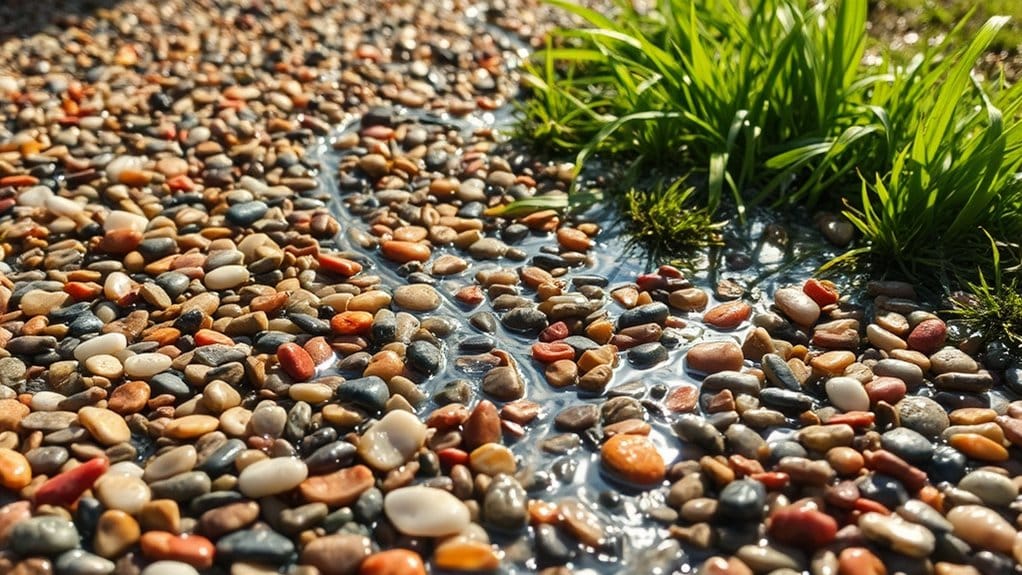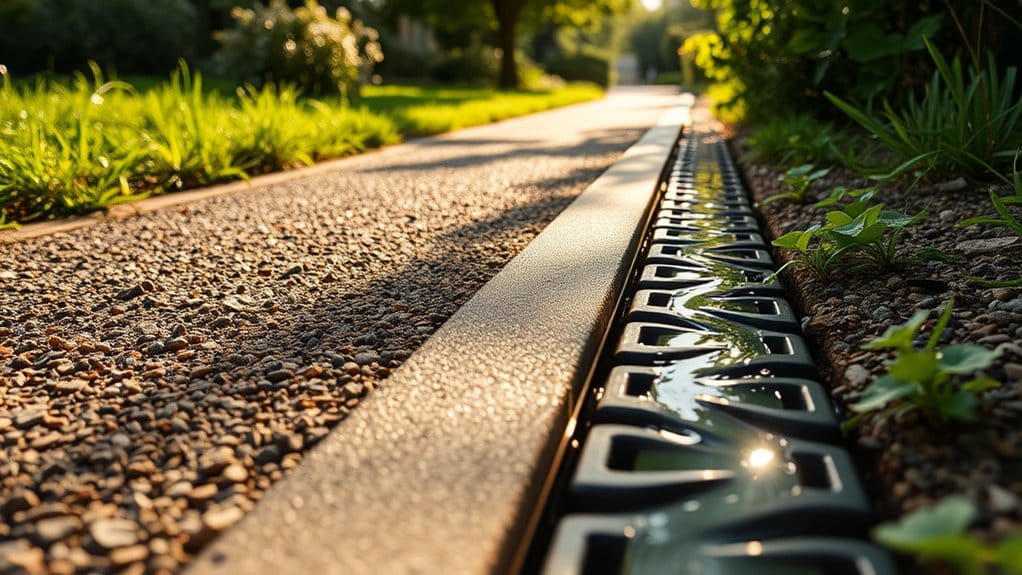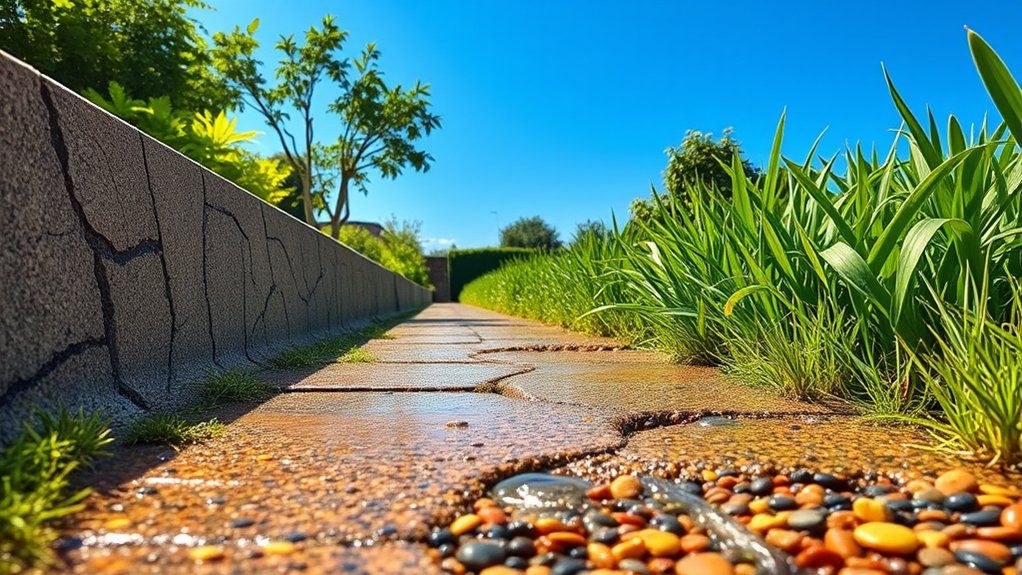Resin-bound gravel offers excellent flood protection by allowing rainwater to drain through its surface, with absorption rates reaching 95%. The permeable structure prevents standing water on driveways whilst letting rain soak naturally into the ground below – often making extra drainage systems unnecessary. This system effectively filters debris before water reaches the sewers, meeting strict UK planning requirements for sustainable drainage. When compared to concrete or tarmac, resin-bound surfaces provide a practical solution to Britain’s increasing rainfall challenges.
Key Takeaways
Resin-bound gravel’s unique structure acts like a giant sponge, naturally soaking up rainfall and preventing water from pooling on your driveway or patio.
This clever system works brilliantly with British weather, letting water drain straight through rather than creating those annoying puddles we’re all too familiar with.
It ticks all the boxes for UK drainage laws (SUDS), making it a proper solution for managing our notorious rainfall. Think of it as a natural filter – catching dirt and debris before water reaches the sewers, which helps prevent local flooding.
The beauty of resin-bound surfaces is how they work with nature, not against it. As water seeps through, it tops up underground water levels naturally, rather than overwhelming drains and causing floods in your neighbourhood.
Perfect for typical British properties, it’s particularly useful for areas prone to flooding or where concrete and tarmac have created drainage problems.
The Permeable Nature of Resin-Bound Gravel

Resin-bound gravel helps manage water effectively through its porous structure. Think of it like a sponge – tiny gaps between the stones let rainwater soak through rather than creating puddles. The resin holds the stones together whilst maintaining these crucial spaces for drainage. This construction is built on layers of gravel or crushed stone for water storage that allows for gradual infiltration.
When it rains, water simply filters through these gaps into the ground below, much like natural soil would. The surface works brilliantly for British weather, as it helps prevent flooding by allowing water to drain naturally instead of running off into already-strained drainage systems. It’s particularly useful for driveways and patios, where standing water can be a nuisance.
Additionally, these surfaces can achieve permeability rates of up to 95%, significantly enhancing drainage effectiveness. Plus, as the water seeps through, it gets naturally filtered, making it an environmentally sound choice that meets UK planning requirements for sustainable drainage.
Benefits for Drainage Systems

Resin-bound gravel creates a porous surface that’s brilliant for managing water, particularly useful in Britain’s rainy climate. It works alongside existing drainage systems to keep gardens and driveways puddle-free.
Key advantages:
- Stops water pooling on your driveway
- Lets rainwater soak naturally into the ground
- Often removes the need for extra drains
- Meets UK drainage regulations (SUDS)
- Filters out dirt before water enters the sewers
Think of it as a giant sponge for your outdoor space – it soaks up rain during heavy downpours, protecting your property from flooding and water damage. This is largely due to its permeable nature, which allows water drainage to the sub-base effectively. Additionally, permeable resin driveways are designed to handle up to 95% of rainfall, making them especially effective in preventing flooding.
It’s particularly handy for areas prone to flooding or properties with drainage issues.
For most UK homeowners, this means no more splashing through puddles on the driveway or worrying about water running into the garage during storms.
It’s a practical solution that works with nature rather than against it.
Environmental Impact and Sustainability

Resin-bound gravel stands out as an eco-friendly paving choice compared to traditional options. It uses natural materials like stone and gravel, which puts less strain on non-renewable resources. The robust nature of these surfaces means they need minimal upkeep, reducing the need for harmful cleaning chemicals and frequent repairs. A key benefit is how the surface handles rainwater – it lets water drain through naturally, much like a garden would. This helps prevent flooding on streets and pavements, particularly useful during Britain’s wet weather. It also helps top up groundwater levels and keeps soil stable, protecting local wildlife areas. Additionally, resin-bound driveways minimize flooding risk and recharge groundwater, enhancing the environmental benefits. The installation process uses less energy than conventional paving methods and creates minimal waste, making them a sustainable solution for managing stormwater effectively. For homeowners and developers looking to make environmentally sound choices, resin-bound gravel offers a practical, sustainable solution that works well in the UK climate.
Comparisons With Traditional Paving Solutions

Comparisons With Traditional Paving Solutions
Resin-bound gravel offers notable advantages over conventional paving when it comes to managing rainwater and preventing floods.
- Resin surfaces allow rainwater to soak through naturally, unlike solid concrete or tarmac.
- The system meets UK Sustainable Urban Drainage Systems (SUDS) requirements.
- Less surface water means lower flood risk, particularly during heavy British rainfall.
- While traditional paving often cracks and blocks over time, resin-bound surfaces maintain proper drainage.
- Natural water filtration helps replenish ground water levels.
Traditional paving typically worsens flooding and often needs extra drainage systems fitted at considerable cost.
Resin-bound gravel presents a practical solution for British weather conditions whilst supporting sustainable water management.
Long-Term Cost Benefits and Maintenance

Resin-bound gravel offers outstanding value for money and minimal upkeep over its lifetime.
Its natural drainage properties slash infrastructure costs and protect against flood damage, whilst keeping you in line with UK SUDS regulations. The smooth, joint-free surface means less hassle – simply sweep or jet-wash when needed.
The UV-stable materials won’t fade or break down in British weather, and you won’t need regular resealing.
When the ground shifts with our changeable climate, the flexible surface moves with it, preventing cracks and costly repairs.
Think of it like a good winter coat – the initial cost pays for itself through years of reliable service.
For UK property owners looking to manage flood risks whilst keeping long-term costs down, resin-bound gravel makes solid financial sense.
Frequently Asked Questions
How Does Resin-Bound Gravel Improve Property Aesthetics?
Resin-bound gravel transforms outdoor spaces with its sleek, professional finish, boosting your property’s kerb appeal and market value. The system blends natural stone with clear resin to create a smooth surface that’s both practical and stylish – imagine the look of loose gravel but without the mess. Available in a range of colours, from warm honey tones to contemporary slate greys, it offers a fuss-free solution that stays looking smart year after year.
Can Resin-Bound Gravel Be Installed in Colder Climates?
Resin-bound gravel can indeed work well in colder UK climates when properly installed. Professional contractors use specially formulated resins that cure effectively even in lower temperatures, whilst offering good resistance to our winter frost cycles. Much like how we treat concrete in winter building work, installers simply need to follow proper cold-weather techniques to ensure a durable finish.
What Colors and Patterns Are Available for Resin-Bound Gravel?
Resin-bound gravel comes in a wide range of colours, from traditional browns and greys to contemporary blacks and whites. Popular choices include bronze, autumn gold and slate grey. Mix-and-match patterns are achievable, letting you create anything from basic borders to eye-catching driveways with contrasting zones. The beauty of resin-bound gravel lies in its versatility – you might fancy a classic honey-coloured finish for your garden path or a striking charcoal blend for your patio.
Is Resin-Bound Gravel Suitable for Driveways and Pathways?
Resin-bound gravel works brilliantly for both driveways and pathways. It’s tough enough to handle cars and regular foot traffic, whilst offering a smart, contemporary finish that’s popular across the UK. Think of it as a permeable alternative to traditional tarmac or concrete – perfect for our rainy British weather. You can choose from various stone colours and sizes to match your property’s style, whether it’s a Victorian terrace in London or a modern home in Manchester.
How Does Resin-Bound Gravel Affect Local Wildlife Habitats?
Local wildlife survival rates are closely linked to habitat quality, and resin-bound gravel offers several ecological benefits. The permeable surface allows natural water drainage, supporting plant growth and providing sustainable environments for insects and small animals. Unlike traditional concrete or tarmac, this surface helps maintain natural soil conditions whilst offering a practical, low-maintenance option for driveways and paths.
Conclusion
With impermeable surfaces becoming widespread across Britain, resin-bound gravel offers a practical solution to flooding that’s often overlooked. The surface lets rainwater drain naturally through to the ground below, reducing pooling and flood risks whilst protecting local drainage systems. Beyond its flood-prevention benefits, this type of paving proves cost-effective over time and maintains an attractive appearance. Rather than watching puddles form on concrete drives during heavy rainfall, homeowners with resin-bound surfaces benefit from efficient drainage that helps safeguard their property.
